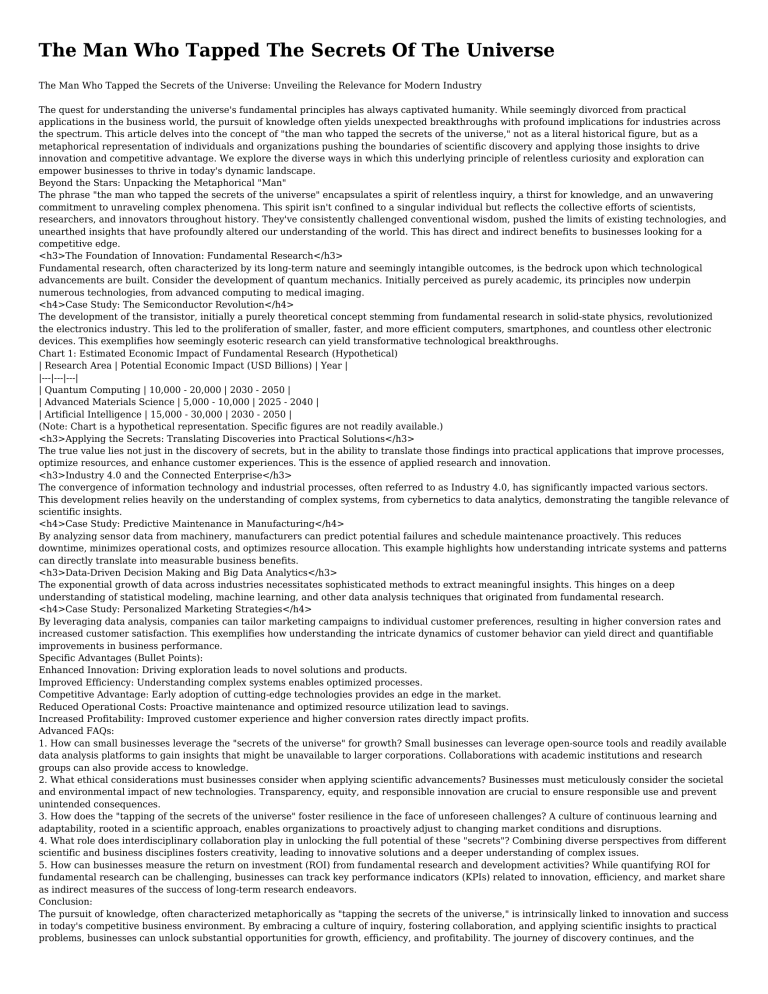
The Man Who Tapped The Secrets Of The Universe
The Man Who Tapped the Secrets of the Universe: Unveiling the Relevance for Modern Industry
The quest for understanding the universe's fundamental principles has always captivated humanity. While seemingly divorced from practical
applications in the business world, the pursuit of knowledge often yields unexpected breakthroughs with profound implications for industries across
the spectrum. This article delves into the concept of "the man who tapped the secrets of the universe," not as a literal historical figure, but as a
metaphorical representation of individuals and organizations pushing the boundaries of scientific discovery and applying those insights to drive
innovation and competitive advantage. We explore the diverse ways in which this underlying principle of relentless curiosity and exploration can
empower businesses to thrive in today's dynamic landscape.
Beyond the Stars: Unpacking the Metaphorical "Man"
The phrase "the man who tapped the secrets of the universe" encapsulates a spirit of relentless inquiry, a thirst for knowledge, and an unwavering
commitment to unraveling complex phenomena. This spirit isn't confined to a singular individual but reflects the collective efforts of scientists,
researchers, and innovators throughout history. They've consistently challenged conventional wisdom, pushed the limits of existing technologies, and
unearthed insights that have profoundly altered our understanding of the world. This has direct and indirect benefits to businesses looking for a
competitive edge.
<h3>The Foundation of Innovation: Fundamental Research</h3>
Fundamental research, often characterized by its long-term nature and seemingly intangible outcomes, is the bedrock upon which technological
advancements are built. Consider the development of quantum mechanics. Initially perceived as purely academic, its principles now underpin
numerous technologies, from advanced computing to medical imaging.
<h4>Case Study: The Semiconductor Revolution</h4>
The development of the transistor, initially a purely theoretical concept stemming from fundamental research in solid-state physics, revolutionized
the electronics industry. This led to the proliferation of smaller, faster, and more efficient computers, smartphones, and countless other electronic
devices. This exemplifies how seemingly esoteric research can yield transformative technological breakthroughs.
Chart 1: Estimated Economic Impact of Fundamental Research (Hypothetical)
| Research Area | Potential Economic Impact (USD Billions) | Year |
|---|---|---|
| Quantum Computing | 10,000 - 20,000 | 2030 - 2050 |
| Advanced Materials Science | 5,000 - 10,000 | 2025 - 2040 |
| Artificial Intelligence | 15,000 - 30,000 | 2030 - 2050 |
(Note: Chart is a hypothetical representation. Specific figures are not readily available.)
<h3>Applying the Secrets: Translating Discoveries into Practical Solutions</h3>
The true value lies not just in the discovery of secrets, but in the ability to translate those findings into practical applications that improve processes,
optimize resources, and enhance customer experiences. This is the essence of applied research and innovation.
<h3>Industry 4.0 and the Connected Enterprise</h3>
The convergence of information technology and industrial processes, often referred to as Industry 4.0, has significantly impacted various sectors.
This development relies heavily on the understanding of complex systems, from cybernetics to data analytics, demonstrating the tangible relevance of
scientific insights.
<h4>Case Study: Predictive Maintenance in Manufacturing</h4>
By analyzing sensor data from machinery, manufacturers can predict potential failures and schedule maintenance proactively. This reduces
downtime, minimizes operational costs, and optimizes resource allocation. This example highlights how understanding intricate systems and patterns
can directly translate into measurable business benefits.
<h3>Data-Driven Decision Making and Big Data Analytics</h3>
The exponential growth of data across industries necessitates sophisticated methods to extract meaningful insights. This hinges on a deep
understanding of statistical modeling, machine learning, and other data analysis techniques that originated from fundamental research.
<h4>Case Study: Personalized Marketing Strategies</h4>
By leveraging data analysis, companies can tailor marketing campaigns to individual customer preferences, resulting in higher conversion rates and
increased customer satisfaction. This exemplifies how understanding the intricate dynamics of customer behavior can yield direct and quantifiable
improvements in business performance.
Specific Advantages (Bullet Points):
Enhanced Innovation: Driving exploration leads to novel solutions and products.
Improved Efficiency: Understanding complex systems enables optimized processes.
Competitive Advantage: Early adoption of cutting-edge technologies provides an edge in the market.
Reduced Operational Costs: Proactive maintenance and optimized resource utilization lead to savings.
Increased Profitability: Improved customer experience and higher conversion rates directly impact profits.
Advanced FAQs:
1. How can small businesses leverage the "secrets of the universe" for growth? Small businesses can leverage open-source tools and readily available
data analysis platforms to gain insights that might be unavailable to larger corporations. Collaborations with academic institutions and research
groups can also provide access to knowledge.
2. What ethical considerations must businesses consider when applying scientific advancements? Businesses must meticulously consider the societal
and environmental impact of new technologies. Transparency, equity, and responsible innovation are crucial to ensure responsible use and prevent
unintended consequences.
3. How does the "tapping of the secrets of the universe" foster resilience in the face of unforeseen challenges? A culture of continuous learning and
adaptability, rooted in a scientific approach, enables organizations to proactively adjust to changing market conditions and disruptions.
4. What role does interdisciplinary collaboration play in unlocking the full potential of these "secrets"? Combining diverse perspectives from different
scientific and business disciplines fosters creativity, leading to innovative solutions and a deeper understanding of complex issues.
5. How can businesses measure the return on investment (ROI) from fundamental research and development activities? While quantifying ROI for
fundamental research can be challenging, businesses can track key performance indicators (KPIs) related to innovation, efficiency, and market share
as indirect measures of the success of long-term research endeavors.
Conclusion:
The pursuit of knowledge, often characterized metaphorically as "tapping the secrets of the universe," is intrinsically linked to innovation and success
in today's competitive business environment. By embracing a culture of inquiry, fostering collaboration, and applying scientific insights to practical
problems, businesses can unlock substantial opportunities for growth, efficiency, and profitability. The journey of discovery continues, and the
lessons learned from the universe can provide invaluable guidance for navigating the complexities of the modern business landscape.
the last word ann arbor menu
